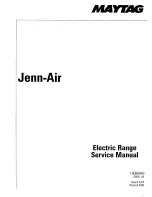
9
■
For foods containing sugar in any form, clean up all spills and
soils as soon as possible. Allow the cooktop to cool down
slightly. Then, while wearing oven mitts, remove the spills
while the surface is still warm. If sugary spills are allowed to
cool down, they can adhere to the cooktop and can cause
pitting and permanent marks.
■
Do not slide cookware or bakeware across the cooktop.
Aluminum or copper bottoms and rough finishes on
cookware or bakeware could leave scratches or marks on the
cooktop.
■
Do not cook popcorn in prepackaged aluminum containers
on the cooktop. They could leave aluminum marks that
cannot be removed completely.
■
Do not allow objects that could melt, such as plastic or
aluminum foil, to touch any part of the entire cooktop.
■
Do not use the cooktop as a cutting board.
■
Use cookware about the same size as the surface cooking
area. Cookware should not extend more than ½" (1.3 cm)
outside the area.
■
Use flat-bottomed cookware for best heat conduction and
energy efficiency. Cookware with rounded, warped, ribbed or
dented bottoms could cause uneven heating and poor
cooking results.
■
Determine flatness by placing the straight edge of a ruler
across the bottom of the cookware. While you rotate the ruler,
no space or light should be visible between it and the
cookware.
■
Cookware designed with slightly indented bottoms or small
expansion channels can be used.
■
Make sure the bottoms of pots and pans are clean and dry
before using them. Residue and water can leave deposits
when heated.
■
Do not cook foods directly on the cooktop.
Hot Surface Indicator Light (under ceramic glass)
The hot surface indicator light will glow as long as any surface
cooking area is too hot to touch, even after the surface cooking
area(s) is turned off.
Coil Elements and Burner Bowls
(on some models)
Coil elements should be level for optimal cooking results. Burner
bowls, when clean, reflect heat back to the cookware. They also
help catch spills.
Cookware should not extend more than ½" (1.3 cm) over the coil
element. If cookware is uneven or too large, it can produce
excess heat causing the burner bowl to change color. For more
information, see the “General Cleaning” section.
NOTE: Before removing or replacing coil elements and burner
bowls, make sure they are cool and the control knobs are in the
Off position.
To Remove:
1. Push in the edge of coil element toward the receptacle. Then
lift it enough to clear the burner bowl.
2. Pull the coil element straight away from the receptacle.
3. Lift out the burner bowl.
To Replace:
1. Line up openings in the burner bowl with the coil element
receptacle.
2. Holding the coil element as level as possible, slowly push the
coil element terminal into the receptacle.
3. When the terminal is pushed into the receptacle as far as it
will go, push down the edge of the coil element opposite the
receptacle.
A. Surface cooking area
B. Cookware/canner
C. ½" (1.3 cm) Maximum overhang
A
B
C










































